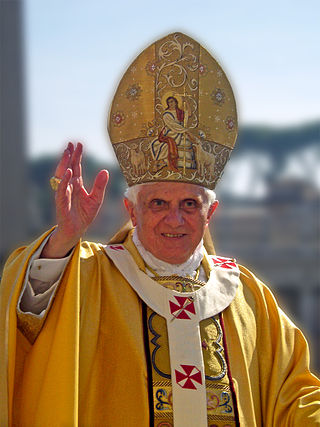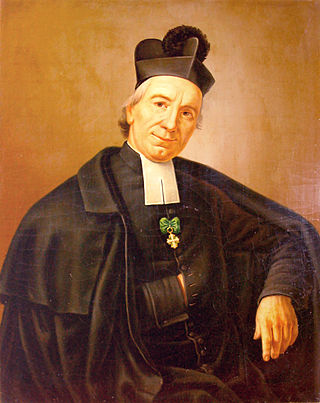Caritas may refer to:
Contents
- The Latin term for charity, one of the three theological virtues
Caritas may refer to:

Pope Benedict XVI was head of the Catholic Church and sovereign of the Vatican City State from 19 April 2005 until his resignation on 28 February 2013. Benedict's election as pope occurred in the 2005 papal conclave that followed the death of Pope John Paul II. Benedict chose to be known as "Pope emeritus" upon his resignation, and he retained this title until his death in 2022.

In Christian theology, charity is considered one of the seven virtues and was understood by Thomas Aquinas as "the friendship of man for God", which "unites us to God". He holds it as "the most excellent of the virtues". Aquinas further holds that "the habit of charity extends not only to the love of God, but also to the love of our neighbor".
Catholic social teaching (CST) is an area of Catholic doctrine which is concerned with human dignity and the common good in society. It addresses oppression, the role of the state, subsidiarity, social organization, social justice, and wealth distribution. CST's foundations are considered to have been laid by Pope Leo XIII's 1891 encyclical, Rerum novarum, which advocated distributism. Its roots can be traced to Catholic theologians such as Thomas Aquinas and Augustine of Hippo. CST is also derived from the Bible and cultures of the ancient Near East.

The theology of Pope Benedict XVI, as promulgated during his pontificate, consists mainly of three encyclical letters on love (2005), hope (2007), and "charity in truth" (2009), as well as apostolic documents and various speeches and interviews. Pope Benedict XVI's theology underwent developments over the years, many of which were characterized by his leadership position in the Congregation for the Doctrine of the Faith, which is entrusted with preserving the Catholic faith in its entirety.

Deus caritas est, subtitled De Christiano Amore, is a 2005 encyclical, the first written by Pope Benedict XVI, in large part derived from writings by his late predecessor, Pope John Paul II. Its subject is love, as seen from a Christian perspective, and God's place within all love. Charity is one of the three theological virtues; and the other two were treated in two successive encyclicals, one signed by Benedict and one written substantially by him but signed by his successor Pope Francis . This text begins with a reflection on the forms of love known in Greek philosophy—eros, agape, philia (friendship)—and their relationship with the teachings of Jesus.

Giuseppe Benedetto Cottolengo or Joseph Benedict Cottolengo was the founder of the Little House of Divine Providence and is a saint of the Roman Catholic Church.
Populorum progressio is an encyclical written by Pope Paul VI on the topic of "the development of peoples" and that the economy of the world should serve mankind and not just the few. It was released on 26 March 1967.
The International Union of Catholic Esperantists is an organization of Catholic Esperanto speakers. It was founded in 1910 in Paris and is now headquartered in Rome.
Deus caritas est may refer to:
The Pontifical John Paul II Institute for Studies on Marriage and Family is a Catholic research institution at the Catholic University of America in Washington, D.C. The institute is devoted to the study of the truth about the human person in all of its dimensions: theological, philosophical, anthropological, and cosmological-scientific. The institute views that it centers its study of the person in the community that is the original cell of human society: marriage and family.

Spe salvi, referencing the Latin phrase from Romans 8:24, Spe salvi facti sumus, is the second encyclical letter by Pope Benedict XVI promulgated on November 30, 2007, and is about the theological virtue of hope. Benedict has systematically touched upon the three theological virtues: love in 2005 Deus caritas est, hope in this encyclical, and faith in 2013 Lumen fidei, written with Pope Francis.
God is Love may refer to:
Godspy is a dormant English-language online magazine "for Catholics and other seekers" launched in 2003, dealing with subjects from "politics to the arts, science to the economy, sexuality to ecology," and exploring the "ideas and experiences that reveal God's presence in the world." The magazine's name was inspired by the line in King Lear: "And take upon's the mystery of things, As if we were God's spies".
The theology on the body is a broad term for Catholic teachings on the human body.
The post–Vatican II history of the Catholic Church is the recent history of the Catholic Church since the Second Vatican Council (1962–1965).

Caritas in veritate is the third and last encyclical of Pope Benedict XVI, and his only social encyclical. It was signed on 29 June 2009 and was published on 7 July 2009. It was initially published in Italian, English, French, German, Polish, Portuguese, and Spanish.
Veritate may refer to :
Caritas Ticino is a non-profit organisation based in Ticino, Switzerland. It is one of the regional organisations of the national Caritas Switzerland.
Lumen fidei is the first encyclical of Pope Francis, issued on 29 June 2013, the Solemnity of Saints Peter and Paul, and published on 5 July 2013, less than four months after his election to the papacy. It was issued in conjunction with the Year of Faith proclaimed by Pope Benedict XVI to be observed from October 2012 to November 2013. It was the first encyclical in the history of the Catholic Church written by two popes, being begun by Pope Benedict XVI and finished by Pope Francis.
August Adam was a German Catholic theologian. He is known for The Primacy of Love (1931), a theological study of love which argued for a rethinking of Catholic approaches to sexuality, chastity and morality.